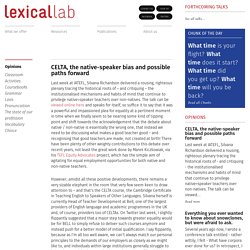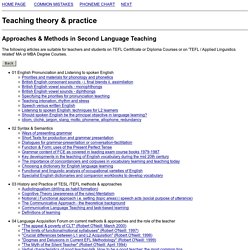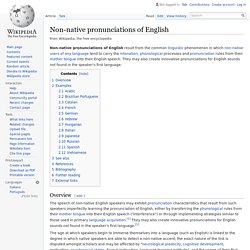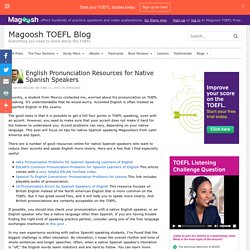

CELTA: some things you need to know – The TEFL Show. In this episode we give a brief introduction to CELTA, probably the most popular and widely recognised certificate for English language teachers.

We start off by describing some of the strengths of the course. In the second half we look at a few shortcomings of the course, and suggest what in our opinion should be changed. Don’t forget that it’s also available on a number of music services. Just click on one of the logos below to be redirected the service. If you enjoyed one of the episodes, we would appreciate if you rated it or left a comment. Like this: Like Loading... Related 6 things you should know about teaching pronunciation The more 'native-like' the pronunciation, the better, right?
Celta-course.com: What is a CELTA course like (1) ? To find out what doing a CELTA course is like, we talked to Rob McCaul over the four weeks the course lasted...

Week 1 | Week 2 | Week 3 | Week 4 Wednesday, Week 1, and Rob sounded fairly laid back about things, though he did say he'd only got 10 minutes for a chat, as there was this class he had to prepare for tomorrow. So far the course was going well, Rob thought. Today was his second day of teaching practice -- or "TP" as we call it. "I was a lot more nervous today -- didn't feel I'd done nearly as well, but the other trainees who were observing me gave me a lot of encouragement and said in fact they thought I'd done better," he said.
CELTA, the native-speaker bias and possible paths forward. Last week at IATEFL, Silvana Richardson delivered a rousing, righteous plenary tracing the historical roots of – and critiquing – the institutionalised mechanisms and habits of mind that continue to privilege native=speaker teachers over non-natives.

The talk can be viewed online here and speaks for itself, so suffice it to say that it was a powerful and impassioned plea for equality at a pertinent moment in time when we finally seem to be nearing some kind of tipping point and shift towards the acknowledgement that the debate about native / non-native is essentially the wrong one, that instead we need to be discussing what makes a good teacher good – and recognising that good teachers are made, not created at birth! However, amidst all these positive developments, there remains a very sizable elephant in the room that very few seem keen to draw attention to – and that’s the CELTA course, the Cambridge Certificate in Teaching English to Speakers of Other Languages. The choice is ours. A Critique of Hugh Dellar on Celta.
I don’t like to get involved in arguments or debates online.

It just happens from time to time. This is one of those times. Hugh Dellar, former Celta tutor, teacher, teacher trainer, coursebook writer, and presenter, recently wrote an impassioned and typically strident critique of Celta and courses of its ilk in the aftermath of what many are seeing as a seminal plenary talk by Silvana Richardson at IATEFL 2016 on the topic of native speaker vs. non-native speaker bias in our profession. Hugh basically puts forward a case against Celta, and calls for its replacement with something better. I have nothing against the idea of establishing better qualifications and standards for our profession, but this will only succeed when the argumentation is sound, and so I feel compelled to respond to Hugh’s key arguments.
How to Answer the Salary Question During a Job Interview. Negotiating your salary may be awkward, but it’s also incredibly important.

Your starting salary sets the bar for your future earnings, from overtime to raises and promotions. So, when the topic inevitably comes up during your job interview, you want to be prepared. Here’s how to approach the subject. It should go without saying, but research is key to nailing your job interview, and that includes the salary question. You can get an idea of what the market rate for your position is using sites that crowdsource salary information, like Glassdoor and PayScale.
“If you review this data prior to an interview you will at least have an idea of what the range is for the type of position you are applying for,” says David Carlson, author of Hustle Away Debt. Also, the nonprofit Educate to Career has a free salary calculator to help you determine your salary benchmark, based on your occupation and location. What To Look For In Your International Teaching Contract - International Schools Forum - International Educator's.
Forums - International Educator's. Teachers professional development. CELTA Webinar (FULL) Teaching and learning English pronunciation. Common Mistakes in English by Language Background Why learn or teach "phonology"?

While the term phonetics relates to 'detailed analysis of the sounds and sound production of the human race', phonology focuses on 'speech sounds which belong to a particular language system'; hence the phrases "English phonology" and "French phonology". You may come across books on "The Phonetics of French". Such a title implies "a detailed study in acoustic terms from the point of view of substance rather than meaning. " However, it is more than likely that the focus will be on French phonology i.e. in the context of meaning. Phonemes belong to given language systems, so while phonetic script can be used to transcribe the sounds of all known languages, the British English phonemic alphabet just contains the 44 symbols needed to transcribe British English.
When comparing language systems, L1 relates your native language, and L2 to a second language (e.g. English language teaching methods and approaches. The following articles are suitable for teachers and students on TEFL Certificate or Diploma Courses or on 'TEFL / Applied Linguistics related' MA or MBA Degree Courses.

I am indebted to Robert O'Neill for giving me permission to use his excellent articles on Language Acquisition. It is with great sadness that I learnt recently of Robert's death. He died on 29th July 2014 at the age of 81. English pronunciation practice for Portuguese speakers. Non-native pronunciations of English. Overview[edit] The speech of non-native English speakers may exhibit pronunciation characteristics that result from such speakers imperfectly learning the pronunciation of English, either by transferring the phonological rules from their mother tongue into their English speech ("interference") or through implementing strategies similar to those used in primary language acquisition.[1] They may also create innovative pronunciations for English sounds not found in the speaker's first language.[1] The age at which speakers begin to immerse themselves into a language (such as English) is linked to the degree in which native speakers are able to detect a non-native accent; the exact nature of the link is disputed amongst scholars and may be affected by "neurological plasticity, cognitive development, motivation, psychosocial states, formal instruction, language learning aptitude", and the usage of their first (L1) and second (L2) languages.[2] Examples[edit] Arabic[edit]

English pronunciation practice for Portuguese speakers. The differences between English and other languages. English Pronunciation Resources for Native Spanish Speakers. Recently, a student from Mexico contacted me, worried about his pronunciation on TOEFL speaking.

It’s understandable that he would worry. Accented English is often treated as imperfect English in ESL exams. The good news is that it is possible to get a full four points in TOEFL speaking, even with an accent. However, you need to make sure that your accent does not make it hard for the listener to understand you. Accent problems can vary, depending on your native language. **HOW TO ACHIEVE A VERY GOOD GRADE IN CELTA COURSE?** - TEFL Forum. Hi there, I got a Pass A when I did my CELTA, which I put down to a couple of factors.

First, I had previously taken an online TEFL course, which meant that the basic principles of lesson-planning were not new to me. I was also familiar with a lot of the terminology. Secondly, I worked incredibly hard, and listened carefully to the advice of my tutors. TEFL Store UK. CELTA Books Young Learners Books Delta Books. How to Prepare for the CELTA Course. Preparation Tasks Grammar Refresher Preparation Course for CELTA Recommended Books Lesson Planning CELTA Advice From recommended readings to preparation courses, we look at the best ways to prepare for the CELTA course (and maybe even come out with a better result at the end!) Ok, so you've decided where to take the CELTA and even applied.
You may even have successfully completed the interview and demonstrated a good level of language awareness and that you can deal with the demands of the course. You feel prepared to work closely and collaboratively with the other trainees in an intense but fun atmosphere... IH CELTA course in Ljubljana, Slovenia? TEFL International - Get The Best TEFL TESOL Course! Dave's ESL Cafe's Teacher Training Forum. The Celta Diaries. Honey, I’m home! And I got Pass A in CELTA! – Absolute Beginner. The moment I opened the envelope with the result was unforgettable. I almost fell off my chair at the little pizzeria where we, the CELTA trainees and the tutors went for lunch on our last day of the course. My hands were shaking and were all sweaty because till the last possible minute I wasn’t sure if it could be possible.
But here it was, Pass A. Susie Celta. Language Teaching Professionals. Know Howe for English Motiboosters & Fillers. How Emotions Affect Learning, Behaviors, and Relationships. We need all of our emotions for thinking, problem solving, and focused attention. We are neurobiologically wired, and to learn anything, our minds must be focused and our emotions need to "feel" in balance.
Emotional regulation is necessary so that we can remember, retrieve, transfer, and connect all new information to what we already know. When a continuous stream of negative emotions hijacks our frontal lobes, our brain's architecture changes, leaving us in a heightened stress-response state where fear, anger, anxiety, frustration, and sadness take over our thinking, logical brains. Neuroplasticity/Feelings Neuroplasticity is the brain’s capacity to rewire, strengthening pathways between neurons that are exercised and used while weakening connections between cellular pathways that are not used or retrieved.
The processes that support emotional intelligence are addressed in the growing field of Interpersonal Neurobiology (IPNB). How Great Teacher Candidates Interview Differently. ESL Job Interview Tips: How To Prepare For Your Interview. Job interviews are a fact of life, but that doesn’t make them any less scary to go through. Your ESL job interview is the most important part of your job application process, and there are a number of things to consider before your interview to ensure success. After all, it’s likely that you’re competing with hundreds of other teachers for similar positions. Non-Native English Speakers in TESOL {NNEST} of the Month Blog.
Can a Non-Native English Speaker Become an EFL Teacher? Practical Grammar 3: Student Book with Key: Ceri Jones, John Hughes: 9781424018079: Amazon.com: Books. Would anyone here have any recommendations/experience with TEFL courses in Dublin? : ireland. Teaching English in Ireland - Eslbase.com. The following information and comments are from English teachers who have taught, or are currently teaching English in Ireland.
English as a Second Language (ESL) Teacher Salary (Ireland) Honey, I’m home! And I got Pass A in CELTA! – Absolute Beginner. A blog created for trainees and tutors on our CELTA courses at CELT. CELTA lesson plans – back to front planning. Your tutor has just given you the materials you will be using for your next assessed lesson along with some notes. “The Ultimate Guide to CELTA”: Book Review. Useful links for CELTA. How can I choose the best TEFL course? - Oxford TEFL. Dylan Gates, GRANADA, Spain. Security Check Required. My CELTA experience: an intense, exhilarating and enlightening course.
It’s new teacher week here at Cambridge Conversations. All week, we’re sharing advice aimed at teachers just starting out on their ELT journey. Yesterday, Alastair Horne looked back to his disastrous first day in the ELT classroom, and in today’s post, newly-qualified teacher Rachel Daw shares her experiences of studying for a CELTA in Berlin.
There were late nights, there were panicked emails sent to tutors, and there was a lot of chocolate and coffee consumed. Celta c grade for applying for a job in ireland. CELTA. 1. TEFL/CELTA/CELT answers... - Page 22. CELTA part time course in Dublin. Teaching English Courses in Dublin, Ireland. How to overcome observation anxiety- Tips for CELTA and Delta trainees – – CELT Athens. 10 books you need to read if you're taking a four-week TESOL course. Is the CELTA course just for new teachers? Just The Word. I’ve Heard of TTT vs STT, But What Does That Really Mean? by James Taylor. CELTADELTA. Preparing for the CELTA in Nine Easy Steps. Little tips from CELTA training that go a long way.
10 Tips for Lesson Observations. Post-CELTA. 10 Recommended Books for the CELTA Course. Is the CELTA a Waste of Time? CELTA tip: language analysis assignment. Course: A Toolkit for CELTA. CELTA tip: the language skills assignment. CELTA Comparative by Koki Shimazu on Prezi. Post-CELTA professional development: Dogme materials.